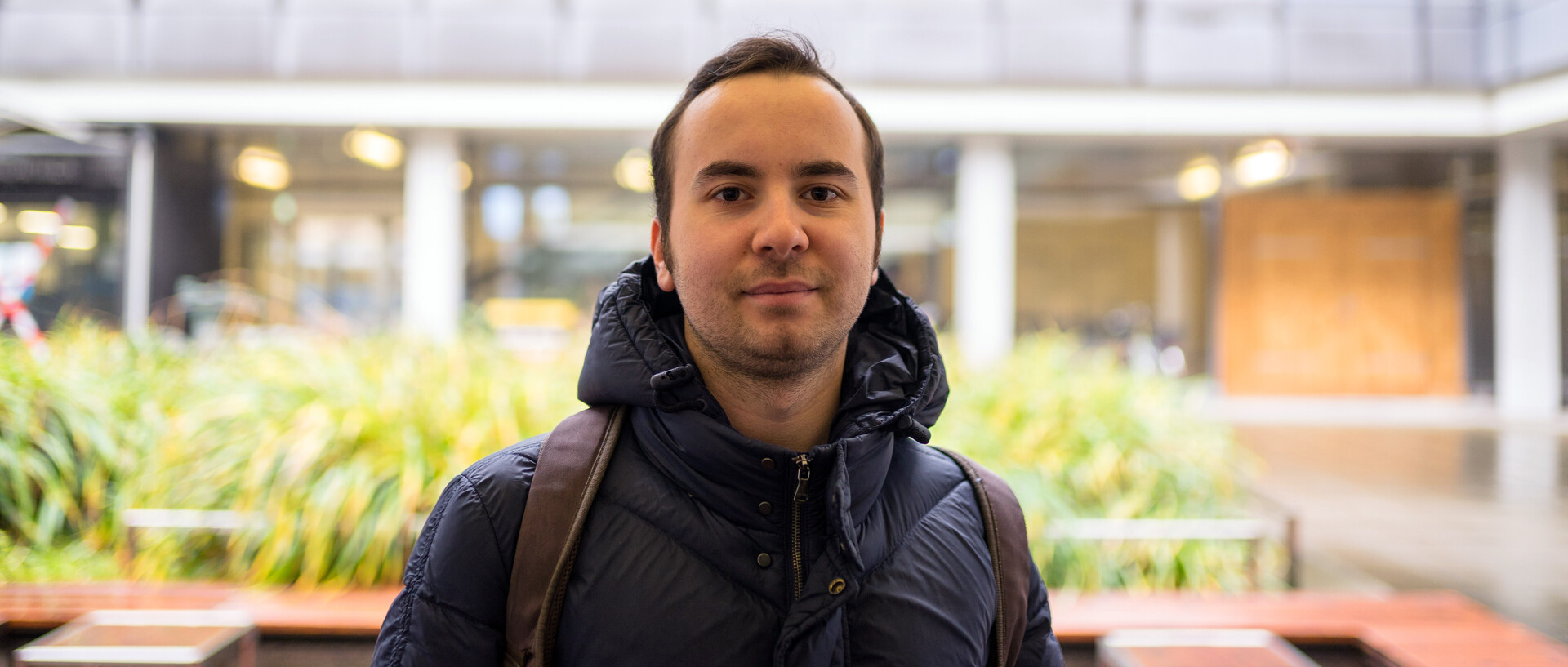“If you want your dream enough, it will come true.”
Alexander Goncharsky is 24 years old and is about to finish his master’s degree. In his myUniMA Story, he shares the highlights from his time studying in Mannheim, and tells us about representing Germany at the International Statistics Olympiad in Iran, and doing an internship at the Bundesbank.
What made you come to Germany?
I’ve been in Germany for two and a half years now, studying a master’s program in Economics. During my bachelor's program in Moscow, I spent a semester at the Humboldt-Universität in Berlin where I got a taste of student life in Germany. I liked how the programs of study were organized here, and it made me want to get my master’s degree in Germany. However, when I arrived in Mannheim, I noticed that things were a little different to Berlin. The city is much smaller, but that’s actually a good thing when studying because there are fewer distractions, like parties.
Does Mannheim seem more like a village to you in comparison to Moscow and Berlin?
When I first came to Mannheim, I thought it was extremely quiet. I didn’t know anything about the city before I arrived, other than that the Schloss was pretty. In the beginning, it seemed so small to me, but now, having lived here for two years, I’ve gotten used to it and am very comfortable here. When I did my internship at the Bundesbank in Frankfurt for example, I felt like I was back in a major city. I realized how difficult it must be to get used to living in a big city like that after living somewhere smaller. What I like about Mannheim is that the students know each other. When my brother came to visit, he was surprised when five or six people said hello to me on the tram. This is very unlikely to happen in Moscow because it’s such a huge city.
How does studying in Germany compare to your bachelor’s program in Moscow?
There are not many differences in terms of the content. I find the professors at the University of Mannheim very interesting as they work at the European Central Bank or the Bundesbank. So, they know the theory and have practical experience. Since living in Germany, I have also been able to gain work experience at the Bundesbank and the Centre for European Economic Research (ZEW). In Moscow, there aren’t as many internships available. You can, of course, work while studying, but I think that would be hard. The University of Mannheim was also my first choice because it is one of Europe’s best universities for Economics.
While studying in Mannheim, you participated in the International Statistics Olympiad, where you won bronze. What was that like?
I got to represent the University of Mannheim at the International Statistics Olympiad in Iran. I hadn’t been to Iran before, so I read a lot about the country before my trip. When I arrived, everyone was very nice to me. It was totally different to what is reported about the country in the news. The Olympiad itself was also very interesting. I had to take three tests. I represented Germany during the contest – that was a little weird at times. I spoke to the participants representing Russia in my native language, Russian, and they even asked me why I was competing for Germany.
What do you do in your free time?
I play table tennis or do other sports. Sometimes, I watch operas at the National Theater, Mannheim. I also travel a lot – Germany has very good train connections. I meet up with my family in different places across Europe. Another thing that I enjoy is cross-country skiing. I went cross-country skiing in the Black Forest last year. I live in student housing where I share my apartment with other international students from Vietnam, Taiwan, and Brazil, and a few German students. I spend most of my time with Germans. I like it like that as it helps me to understand the German way of life and thinking better. In Russia, people always ask me if I find German people welcoming. There is a stereotype that Germans are reserved and impossible to become friends with. I would say that that stereotype might be true in the beginning. But as soon as you have made German friends, they are very honest and open, just like in Russia.
Do you want to stay in Germany after graduation?
Right now, I am applying for positions at banks and research centers, but I’m also looking for good doctoral programs. I’m open to everything really. Generally, I’d like to work for a while first. In order to be able to establish theories about something, you have to have practical work experience. There are many good opportunities in Germany, but I would also move to a different country if necessary. I definitely like living in Germany though.
What have you learned during your time in Mannheim?
I have learned that you have to keep on dreaming. If you want your dream enough, it will come true. I probably wasn't at the top of my class in Moscow, but I still made it to Mannheim, received a scholarship for a year and got to work afterwards – I tutored students of the bachelor's program in microeconomics and macroeconomics. It’s sad that I don’t get to see my Russian friends at the moment. But if you always stay with your friends, you might not get the chance to grow. You always stay in touch with good friends anyway. It’s even better if you have a lot to talk about and meet new people.
Text: Anna-Lena Lämmle / January 2018
